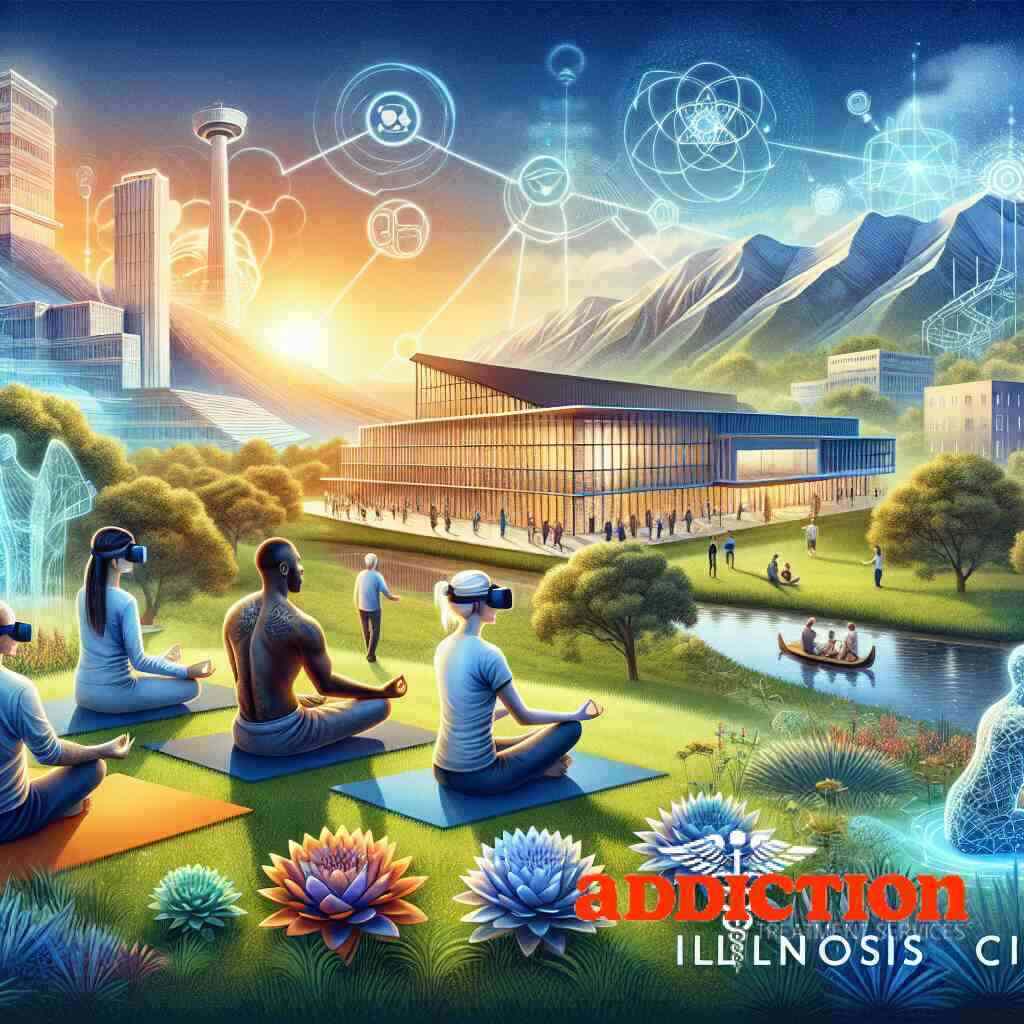 Posted On: 07/22/2025
Posted On: 07/22/2025Embarking on a New Era in Dual Diagnosis Treatment
Understanding Dual Diagnosis: A Complex Challenge
The term “dual diagnosis” refers to the co-occurrence of a mental illness and a substance use disorder within the same individual. Addressing dual diagnosis challenges requires a multidisciplinary approach, emphasizing both mental health and addiction treatment strategies. This complexity stems from the fact that symptoms of one condition can exacerbate the other, making diagnosis and treatment particularly challenging. In Illinois, progressive addiction recovery methods are increasingly focusing on integrated care strategies to tackle this issue. By understanding the intricate interplay between these disorders, professionals can craft more effective treatment plans tailored to individual needs.
The Illinois Innovation Landscape
Illinois is setting the precedent in pioneering dual diagnosis therapy, boasting a landscape rich with innovative treatment approaches. The state is home to some of the most advanced dual diagnosis programs that combine cutting-edge therapies with traditional recovery models. These initiatives aim to offer more accessible and effective options for individuals grappling with complex conditions. By focusing on a comprehensive dual diagnosis approach, Illinois endeavors to provide state-of-the-art dual diagnosis centers that cater to every aspect of a patient’s mental health and substance use disorder. These centers offer an array of services, from psychotherapies to medication-assisted treatments, showcasing Illinois as a leader in behavioral health innovation.
The Rising Need for Integrated Care
There is an urgent need for integrated treatment for substance use, especially as the rates of dual diagnosis continue to rise. Personalized and cohesive care methods help streamline the recovery process, reducing duplication of efforts and enhancing patient outcomes. Illinois addiction treatment advancements highlight the importance of a synchronized care system that spans across various health disciplines. With a growing emphasis on integrated mental health and addiction care, Illinois is poised to meet the rising demand for comprehensive dual diagnosis treatment options. As community initiatives in mental health expand, they simultaneously create a supportive framework essential for sustainable recovery journeys.
Innovative Treatment Modalities Redefining Illinois’ Approach
Cutting-edge Dual Diagnosis Therapies
Illinois is renowned for its cutting-edge dual diagnosis in Illinois, which seamlessly incorporates modern science with practical treatment methods. By leveraging innovative therapies, professionals craft individualized plans that address the unique intricacies of each patient’s mental health and substance use struggles. Techniques such as cognitive-behavioral therapy and contingency management are frequently utilized, providing patients with tools to manage both their mental illness and addiction simultaneously. These therapies are rooted in evidence-based practices, ensuring that patients receive the most efficient and effective care possible. As Illinois continues to embrace these trailblazing methods, the landscape of dual diagnosis treatment is reshaping the very nature of recovery.
Innovations in treatment modalities are redefining how addiction recovery services in Illinois approach patient care. By focusing on the individual’s needs, cutting-edge therapies address the root causes and interconnected factors of dual diagnoses. Such personalized strategies not only improve patient outcomes but also enhance the state’s comprehensive approach to mental health and addiction treatment innovations.
Advancements in Medication-Assisted Treatments
Medication-assisted treatments (MAT) are a cornerstone of Illinois addiction treatment advancements. These treatments blend pharmacological support with counseling and behavioral therapies, addressing the physical and psychological facets of addiction and mental health disorders. By incorporating medications such as methadone, buprenorphine, and naltrexone, treatment centers offer a balanced approach to managing withdrawal symptoms and reducing cravings.
The evolution of MAT in Illinois highlights the state’s commitment to integrated treatment for substance use disorders, providing a harmonious blend of medication and therapy. These advancements ensure that patients have access to a variety of options that cater to their specific needs, strengthening their overall recovery process. This dual-focused strategy not only mitigates the risk of relapse but also empowers patients to regain control over their lives through a structured and supportive framework.
Holistic Approaches to Dual Diagnosis
Holistic approaches play a pivotal role in enriching holistic dual diagnosis Illinois by addressing the mental, physical, and spiritual aspects of addiction recovery. Techniques such as mindfulness meditation, yoga, and nutritional education are increasingly integrated into treatment plans, providing a rounded recovery experience that promotes long-term wellness.
In Illinois, these holistic methods complement traditional therapy and medication by fostering an environment of healing and self-awareness. This comprehensive dual diagnosis approach in Illinois recognizes the importance of catering to the whole person rather than just the symptoms of addiction or mental illness. By emphasizing the interconnectedness of mind, body, and spirit, these innovative approaches lead the charge toward sustainable recovery and lasting change.
Holistic treatments enhance the recovery journey by offering patients alternative pathways to reconcile their dual diagnoses. Through a blend of modern medicine and time-honored practices, Illinois is setting a precedent for future trends in integrated mental health care.

Technology-Driven Solutions in Dual Diagnosis Care
Telehealth and Remote Recovery Support Services
In the ever-evolving landscape of addiction treatment services, telehealth has emerged as an indispensable tool in the fight against dual diagnosis. With the ability to bridge geographical barriers, telehealth provides accessible addiction treatment services near you, offering real-time support and counseling to patients who may otherwise face obstacles in accessing care. This remote recovery option is crucial in maintaining continuity of care and fostering an environment where individuals can engage with therapists and support groups from the comfort of their homes. The implementation of telehealth solutions for dual diagnosis keeps patients connected with treatment facilities, ensuring they receive consistent guidance and encouragement throughout their recovery processes.
Illinois addiction treatment advancements underscore the significance of telehealth in holistic dual diagnosis treatment. By facilitating outpatient treatment and intensive outpatient programs, telehealth services offer a spectrum of virtual care options, accommodating the diverse needs of patients with dual diagnoses. Through seamless integration into existing treatment models, telehealth paves the way for innovative dual diagnosis care that adapts to the challenges of a rapidly changing healthcare environment.
Leveraging Data Analytics for Personalized Care
Data analytics is revolutionizing the approach towards integrated treatment for substance use, offering insights that tailor recovery programs to the individual needs of each patient. By analyzing patterns and outcomes, professionals can devise personalized treatment plans that optimize the recovery process. These analytical tools help in identifying triggers and developing proactive strategies for relapse prevention, enhancing the effectiveness of treatment interventions.
In Illinois, addiction treatment centers employ data-driven techniques to monitor patient progress and adjust therapies accordingly. This nuanced approach results in a sophisticated understanding of the interplay between mental health disorders and substance use, enabling a comprehensive dual diagnosis approach that aligns with patient-specific profiles. By leveraging data analytics, Illinois is at the forefront of mental health and addiction treatment innovations, promoting a future where recovery pathways are as unique as those they serve.
VR and AI: The Future of Behavioral Health Innovations
Virtual reality (VR) and artificial intelligence (AI) are pioneering new frontiers in behavioral health, offering immersive experiences and predictive insights that redefine the boundaries of addiction recovery. VR provides a powerful platform for exposure therapy, allowing patients to confront anxiety-inducing situations in a controlled environment. Such advancements in VR and AI in behavioral health signify a leap forward in therapeutic methodologies, enriching psychotherapy in addiction recovery with groundbreaking tools.
AI contributes by processing large datasets to forecast patient outcomes and optimize treatment pathways, enabling real-time adjustments that personalize care delivery. This technological synergy ensures that Illinois’ state-of-the-art dual diagnosis centers remain at the cutting edge of recovery science. Embracing these innovations accentuates Illinois’ commitment to integrating technological advancements into dual diagnosis treatment, solidifying its role as a trailblazer in the health care sector.
Policy and Community Initiatives Pioneering Progress
Government Support and Funding Mechanisms
In Illinois, government support plays a pivotal role in the advancement of dual diagnosis treatment. Funding mechanisms have been established to provide resources for state-of-the-art dual diagnosis centers, facilitating a synergistic approach to mental health and addiction recovery. By allocating financial resources strategically, Illinois addresses the need for holistic dual diagnosis treatment, ensuring that facilities can implement cutting-edge therapies and maintain high standards of care. The government’s commitment to supporting these initiatives reflects in the expansion of funding for advanced dual diagnosis programs, thereby ensuring sustained progress in the field.
Furthermore, government-sponsored educational programs promote awareness and understanding of dual diagnosis among professionals and the public. These programs emphasize the importance of integrated treatment models that address both mental health and substance use disorders. Through policy advancements and increased funding allocations, Illinois aims to foster an environment conducive to pioneering dual diagnosis therapy, thereby empowering treatment centers to explore new horizons in addiction recovery.
Illinois’ Comprehensive Dual Diagnosis Programs
Illinois is home to advanced dual diagnosis programs that have set benchmarks in the field of dual diagnosis treatment. These programs embody a comprehensive approach, integrating a myriad of therapeutic modalities tailored to meet the diverse needs of individuals suffering from co-occurring disorders. By encompassing different aspects of treatment, from psychotherapies to medication-assisted treatments, these programs ensure that no facet of a patient’s recovery journey is overlooked.
At the heart of Illinois’ comprehensive dual diagnosis strategy is the collaboration between various mental health and addiction treatment services. This collaborative framework enhances the efficacy of treatment interventions, creating a cohesive care continuum that seamlessly transitions patients through different stages of their recovery. Innovation is richly embedded within these programs, as they continuously evolve to incorporate the latest insights in mental health and addiction science. This dedication to excellence positions Illinois as a front-runner in pioneering integrated treatment for substance use and mental health disorders.
Community-based Initiatives and Their Impact
Community-based initiatives play a critical role in shaping the dual diagnosis landscape in Illinois. These initiatives leverage local resources and expertise to formulate responsive solutions to the challenges posed by dual diagnoses. By fostering a sense of community and support, they create an environment where individuals are encouraged to pursue recovery with confidence and hope.
The impact of community initiatives in mental health is felt across various dimensions of care, from early intervention efforts to relapse prevention strategies. These initiatives often involve collaborations with local organizations, healthcare providers, and support groups, ensuring a multidimensional approach to treatment. By emphasizing community participation, these programs effectively bridge the gap between patients and the resources they need to overcome dual diagnoses.
Community-based initiatives also pave the way for increased accessibility to addiction treatment services. They bring treatment facilities closer to the individuals who need them, offering solutions that are culturally sensitive and locally relevant. Through these efforts, Illinois continues to uphold its commitment to delivering compassionate and effective dual diagnosis care, tailoring interventions to meet the nuanced needs of its diverse population.
The Path Ahead: Shaping the Future of Dual Diagnosis in Illinois
Future Trends in Integrated Mental Health and Addiction Care
The landscape of integrated mental health and addiction care is rapidly evolving, particularly in states like Illinois. As future trends in integrated mental health care emerge, an increasing emphasis is placed on technology-driven solutions that bridge gaps in treatment accessibility. Telehealth, for instance, is not only providing real-time therapy sessions through virtual platforms but is also instrumental in reaching underserved populations who might otherwise lack access to quality care. Additionally, advancements in AI and data analytics offer personalized insights into patient care, allowing for more accurate diagnosis and tailored treatment plans. Illinois continues to lead the charge in adopting these cutting-edge modalities, promising a future where mental health and addiction services are seamlessly integrated and universally accessible.
The state is also exploring novel techniques in psychotherapy and exploring the integration of alternative therapies that cater to diverse patient needs. This shift towards a holistic view of recovery promises to transform dual diagnosis care, making it more responsive to the complexities of co-occurring disorders. As Illinois continues to invest in these future-forward approaches, it sets a compelling precedent for other states to follow.
Challenges and Opportunities in Dual Diagnosis Innovations
As Illinois pushes the boundaries of dual diagnosis treatment, the journey towards innovation is not without its challenges. The complexity of co-occurring disorders requires a multifaceted treatment approach, posing significant hurdles in terms of diagnosis and personalized care. However, with these challenges come immense opportunities. The state’s commitment to overcoming these barriers is evident in its comprehensive dual diagnosis approach in Illinois, which aims to harmonize different therapy modalities and provide inclusive care for all individuals.
Regulatory hurdles and funding limitations are persistent issues, yet they have also spurred creative solutions and collaborations between government bodies and private institutions. Such partnerships are pivotal in expanding the state’s dual diagnosis treatment capabilities, providing a framework for innovation amidst adversity. Illinois’ strategic approach to these challenges underscores its leadership role in pioneering dual diagnosis solutions, offering a roadmap for future advancements in the field.
Collaboration and Knowledge Exchange as Catalysts for Change
Collaboration and knowledge exchange are instrumental in driving progress in dual diagnosis care. Illinois excels in fostering an ecosystem where mental health professionals, addiction specialists, and policy-makers converge to share insights and advancements. This collaborative spirit is essential in refining therapeutic strategies and ensuring that care models remain relevant and effective.
By facilitating ongoing dialogues and partnerships, Illinois harnesses the collective expertise necessary for cutting-edge innovations. Conferences, workshops, and shared research initiatives stand out as pivotal platforms for disseminating knowledge and fostering interdisciplinary convergence. This synergy not only enhances the state’s dual diagnosis capabilities but also catalyzes global conversations about innovative treatment approaches.
The state’s commitment to sustaining these collaborative efforts highlights its dedication to harnessing the power of shared knowledge as a catalyst for change. Through these endeavors, Illinois continues to solidify its reputation as a powerhouse in dual diagnosis treatment, inspiring other regions to acknowledge the importance of unity in addressing complex mental health and addiction challenges.

Conclusion: Reflecting on Illinois’ Dual Diagnosis Journey
Summarizing Key Innovations and Their Impacts
Illinois has embarked on an ambitious journey to redefine dual diagnosis care, marking significant strides in the integration of mental health and addiction treatment services. By embracing cutting-edge therapies, advancements in medication-assisted treatments, and holistic approaches, the state has positioned itself as a beacon of innovative dual diagnosis care. These initiatives have fundamentally transformed treatment outcomes, offering individuals comprehensive options to address the intricate challenges of co-occurring disorders. Through the implementation of state-of-the-art dual diagnosis centers, Illinois ensures that residents have access to world-class care, which profoundly impacts the quality of life for those facing dual diagnoses.
Looking Forward: Strengthening Illinois’ Approach
As Illinois continues to forge ahead in dual diagnosis care, the emphasis will remain on strengthening its integrated treatment for substance use and mental health conditions. This will involve expanding access to innovative treatment approaches and enhancing interdisciplinary collaborations among mental health professionals, addiction specialists, and community organizations. Addressing the challenges and opportunities in dual diagnosis will be pivotal in overcoming obstacles and ensuring that advancements in dual diagnosis therapy are sustainable and inclusive. Illinois’ commitment to continuous improvement and adoption of emerging trends will likely set the standard for comprehensive care models in the future, further solidifying its reputation as a pioneer in the field.
Empowering Individuals on Their Recovery Journey
The journey through dual diagnosis is inherently personal and unique to each individual. Illinois’ innovations enable patients to take the first step towards recovery with confidence, offering robust support systems and accessible addiction treatment services near them. The collaborative efforts within the state ensure that every patient receives compassionate care tailored to their specific needs. By empowering individuals through personalized treatment plans and recovery support services, Illinois not only enhances the efficacy of its dual diagnosis programs but also reaffirms its dedication to fostering empowered and resilient communities. As these individuals overcome the hurdles of dual diagnosis, their success stories will continue to inspire hope and transformation across the state and beyond.
Frequently Asked Questions
Question: How does Addiction Treatment Services integrate innovative dual diagnosis care in the offerings provided?
Answer: Addiction Treatment Services integrates innovative dual diagnosis care by providing a comprehensive directory of state-of-the-art dual diagnosis centers in Illinois and beyond. Our focus is on delivering cutting-edge dual diagnosis therapies tailored to meet individual needs. By working with centers that combine cognitive-behavioral therapy, medication-assisted treatments, and holistic approaches, we ensure that patients receive care that addresses both mental health and substance use disorders. Our commitment to integrated treatment for substance use highlights the importance of addressing the complex interplay between co-occurring disorders, thereby enhancing recovery outcomes.
Question: What role does technology play in Illinois addiction treatment advancements at Addiction Treatment Services?
Answer: At Addiction Treatment Services, technology plays a pivotal role in Illinois addiction treatment advancements by facilitating telehealth services and data analytics to personalize care. Telehealth offers accessible addiction treatment services for those in remote areas, maintaining continuous support and connection with therapists. Additionally, we leverage data analytics to create personalized treatment plans that address individual triggers and prevent relapse. This technology-driven approach ensures that individuals receive comprehensive dual diagnosis care tailored to their unique recovery journey.
Question: In ‘What are Illinois’ Top Dual Diagnosis Innovations?’, how does Addiction Treatment Services enhance access to mental health and addiction treatment innovations?
Answer: In the blog ‘What are Illinois’ Top Dual Diagnosis Innovations?’, Addiction Treatment Services enhances access to mental health and addiction treatment innovations by providing a detailed directory of advanced dual diagnosis programs available across Illinois. Our platform ensures that individuals have access to the best dual diagnosis facilities, cutting-edge therapies, and holistic treatment options. By simplifying the search process for treatment centers, we empower individuals to find the right support tailored to their needs, facilitating a smoother and more informed recovery journey.
Question: How do community-based initiatives contribute to progressive addiction recovery methods in Illinois through Addiction Treatment Services?
Answer: Community-based initiatives are integral to progressive addiction recovery methods in Illinois, and Addiction Treatment Services plays a crucial role in connecting individuals with these local resources. These initiatives leverage local expertise to offer culturally sensitive and locally relevant solutions for dual diagnosis care. By fostering partnerships with healthcare providers, local organizations, and support groups, we create a supportive network that encourages recovery with confidence and hope. This collaborative spirit ensures that the recovery process is holistic, addressing the mental, physical, and spiritual aspects of addiction recovery.
Question: What future trends in integrated mental health and addiction care does Addiction Treatment Services anticipate for Illinois?
Answer: Addiction Treatment Services anticipates several future trends in integrated mental health and addiction care for Illinois, including the expansion of telehealth services to increase accessibility, the integration of AI and VR technologies to personalize treatment, and the incorporation of alternative therapy modalities that cater to diverse patient needs. These trends are poised to transform dual diagnosis care, making it more responsive and inclusive. As Illinois continues to lead in mental health treatment breakthroughs, Addiction Treatment Services is dedicated to staying at the forefront, ensuring that individuals receive comprehensive and innovative care tailored to the complexities of co-occurring disorders.


